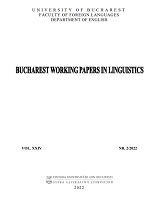Romanian aspectual verbs and the causative alternation
Romanian aspectual verbs and the causative alternation
Author(s): Elena LăcătușSubject(s): Morphology, Syntax
Published by: Editura Universităţii din Bucureşti
Keywords: aspectual verb; control; raising; causative alternation; marked anticausative; Romanian;
Summary/Abstract: The aim of the present paper is to investigate the control/raising behaviour of Romanian aspectual verbs. Following Mourounas & Williamson’s (2019) proposal for English aspectuals, I show that in Romanian these verbs enter the causative alternation, a property which distinguishes them from both raising and control verbs and which can explain their hybrid behaviour. The aspectual verbs which merge with an infinitive and a subjunctive complement evince raising-like behaviour in their anticausative variant and control-like behaviour in their causative variant. Their anticausative variant is not marked and the verb does not project any Voice Phrase. In their causative variant, they project a thematic Voice Phrase which hosts an external argument, assigned an Agent-Initiator theta-role. Some of the verbs in the termina ‘finish’ class have a marked anticausative variant which projects an expletive Voice Phrase (Schäfer 2008) which hosts the voice marker se, whose presence signals the existence of a volitional, external argument in the structure. When these verbs occur with a supine complement they can only have an unmarked form, indicative of causative status, and they behave exclusively like verbs of control.
Journal: Bucharest Working Papers in Linguistics
- Issue Year: XXIV/2022
- Issue No: 2
- Page Range: 81-108
- Page Count: 28
- Language: English

